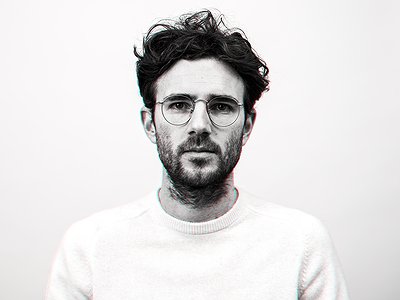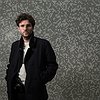Could you take us through a day in your life, from a possible morning routine through to your work? Do you have a fixed schedule? How do music and other aspects of your life feed back into each other - do you separate them or instead try to make them blend seamlessly?
Wake up around 10 and then start the breakfast routine and slowly start to go to the studio and listen back the things I’ve made the other days so I have clean ears and still see any potential in these sketches. Sometimes I record elements and make the composition or do the take the other day to have a clean view on it. If there’s not inspiration I do more media related stuff if there is anything.
Some days i’m just organising my material and look for possible combinations and see what's missing for an EP or album.
If I’m in the mood for creating I just start messing around. If I’m not in the mood for finishing things I just start doing my own sound design and that is something that sparks ideas. Making sounds, organising my personal library, it’s not the biggest fun part but really useful when I’m inspired. I try to get rid of all the shit that I don’t use and make sure I find what I need quickly.
Besides music.
I have more interests and need to separate these from the music and really like it. I need time off from the music to be able to feel inspired again. I study wine analytical tasting and theory and really like to focus on street photography when being abroad. I work on a few series and by doing this I try to compensate the studio hours more with interaction.
And whats nice to mention is that I do my own label design and also did some of my own record sleeves in the past for other labels. I have a background in graphic design.
Besides that I invest a lot of time in my relationship with my girlfriend and we have a lot of similar interests and humor. She’s not into my kind of music or scene at all. And it’s ok.
Could you describe your creative process on the basis of a piece or album that's particularly dear to you, please? Where did the ideas come from, how were they transformed in your mind, what did you start with and how do you refine these beginnings into the finished work of art?
I think for an album I always try to work towards like 20 ideas and then get rid of 50% for the final selection. For albums it’s important to have some sort of general sound aesthetics in mind and have a hyperfocus on certain elements to make a consistent piece of music. To me it’s important that there is variety and consistency. It’s hard to achieve both at the same time but I just think those albums are more inspiring. I try to look at albums from the past that inspired me sometimes.
I think my latest album Autonomous is dear to me because I’ve adapted more technical skills and used them to be creative on the impact of the music. I keep learning. I think the overal vibe of this album is more dark and industrial IDM influenced compared to the last. It goes on where Kinetic Image finished.
Some studio tools also inspired me to work this way. It’s always a combination of a fascination for some tool and a certain aesthetics that you want to achieve. The rest is very intuitive for me ...
There are many descriptions of the ideal state of mind for being creative. What is it like for you? What supports this ideal state of mind and what are distractions? Are there strategies to enter into this state more easily?
Distractions are: social media, phones and Internet. Boredom=inspiration. It’s important to have a certain appetite for something that I want to achieve. A level of naivety is important because with that you do surprising things and come up with something you couldn’t have thought out maybe. There are periods where I feel blocked but it mostly has to do with repetitive state of working and then I know it’s time to change a little bit here and there in the studio or get rid off old habits and lose stuff that you don’t use and that simply intervenes with your production proces. There’s always something I havent tried yet.
It’s important to have an empty mind, so ideas will pop up. Overstimulation isn’t necessarily good. When I’m stuck I just go back and learn from the masters again. And you have to find a creative peak moment, when you feel you can get into the zone. Daytime can deliver a lot of pressure.
I also think GYS (gear acquisition syndrome) is a serious distraction or problem for many producers.
You lose the essence, gear becomes such an obsession and importance, music making becomes secondary..
Do one thing well and go on from there.
How is playing live and writing music in the studio connected? What do you achieve and draw from each experience personally? How do you see the relationship between improvisation and composition in this regard?
I would say a liveset is just an actual representation of my musical status taken from the studio out to the open. So I go naked and really like to try new things instead of playing my hits from the past or whatever. It’s important because I get feedback on this too from club, the people and the sound system. It tells me a lot. I think my performances are kind of hybrid, there is room for improvisation but the main line is kind of sorted. It’s important to have fun whilst doing this and interact.I like the hybrid approach because I don’t work with 100% hardware (I could potentially, but don’t do this) so I can’t replicate what I do in my studio and I’m also not convinced of pure hardware sets for the sake of using hardware. It’s a fashion trend and doesn’t always contribute to the final result. Having too much gear is overrated. I only have two hands.
How do you see the relationship between the 'sound' aspects of music and the 'composition' aspects? How do you work with sound and timbre to meet certain production ideas and in which way can certain sounds already take on compositional qualities?
The proces of producing really differs from time to time. There are periods where I work more from an intuitive “take approach” and get good results with that because I’m directly in the zone and connected with the flow. Some periods I tend to work more in an arrangement kind of approach or rework intuitive jams.
There’s no golden rule, just what gives me the best result for that kind of track and kind of sound aesthetics that I want to achieve. I’m not so conservative with that. Making a visual composition is really different from making an audio composition based on your intuition. The last is most fun, for sure. But it doesn’t always bring me the best results. I try to find a right balance between this.
There are people who say, you can’t make music with a mouse … Well I don’t care if people make great stuff with that, who cares. Some days I eat my food with chopsticks other days with a fork and knife. If people have fun doing it, you will hear it. If I press random on some plugin and it gives me instant satisfaction, I will use it. And if you look back in history, techno as a whole is a big preset based genre. So you should be critical but also not too critical.
Sometimes the compositions I make don’t meet the regular standards and I work more freely. It depends on the type of track. But there isn’t wrong or right sometimes. Trust your intuition.
Our sense of hearing shares intriguing connections to other senses. From your experience, what are some of the most inspiring overlaps between different senses - and what do they tell us about the way our senses work? What happens to sound at its outermost borders?
I always see it like this when performing: no matter how many people there are in a room or club. If there’s 400 people, there’s 400 different interpretations of music and sound at that time even though the same thing is playing. I think everyone has his/her own interpretation of it. It works on the subconscious too. And sound works differently in any setting. I always say there's a record for every moment and it’s the same with settings. Some types of music really bloom at certain moments and really give you this transcending feeling. It triggers the imagination and doesn’t always have to be plain functional sound for your hips or something. I think most music lovers have found a perfect setting for themselves to listen to music.
Art can be a purpose in its own right, but it can also directly feed back into everyday life, take on a social and political role and lead to more engagement. Can you describe your approach to art and being an artist?
I try to keep it pure, clean and straight from my hearth. That is hard sometimes in a world where you’re overwhelmed with impulses and whatever more. There are so many examples of how to make something but I try to work as much as I can from the intuition instead of templates and trends or fashions.
For me it’s hard to see my personality separate from my musical identity but I have to sometimes because I’m not some one dimensional being. I’m serious and dedicated in what I do and try to keep it pure but there are times where I really have to disconnect from that.
Besides being an artist I’m a music lover and being a music lover I have an opinion or taste.
It is remarkable, in a way, that we have arrived in the 21st century with the basic concept of music still intact. Do you have a vision of music, an idea of what music could be beyond its current form?
I find it an interesting question but there haven’t been many radical changes in the last 15 years when it comes to technology in music production. Roland is reissuing stuff they made 30 years ago in 1 on 1 similar forms. So in that sense, nothing changed ... Still people lean heavily on past technology.
The DAW came. VSTs were introduced and after that … Nothing really revolutionary happened. I mean the change from a hardware synth to a software tool was revolutionary. It wasn’t just something for rich producers and studios anymore, anybody could start making music with a computer.
The development of people going back to modulars and physical machinery is good because I think it brings more joy in music making.
When you make music you perform something and you need some form of physical contact with an interface for that. A knob or a key or pots and pans whatever.This will always remain I think. If it’s purely programming or an abstract form there wouldn’t be any room for surprises or spontaneity. So I think that there will always be some hybrid form of music production and creation and things become very cross genre.
Even though everything is possible with the used technology nowadays and everything is available I think the human ear just demands a certain simplicity in music, so it remains understandable.



